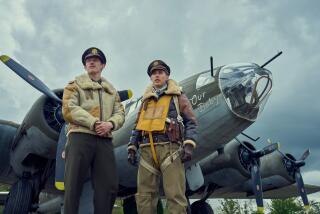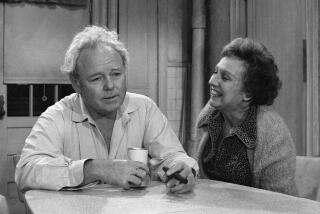Generals Conquer the Airwaves : Television: A grateful nation’s affection for its soldiers as individuals has turned into a flag-waving glorification of war and the military.
- Share via
My heroes have always been doughboys.
Or anyone else in military uniform, since gliding through childhood on the wings of World War II movies that glamorized combat and had my pals and me aching to grab our toy guns and join John Wayne, even though Hitler and the Japanese had already been defeated.
And now, with a stunning allied victory in the Persian Gulf to push America’s emotional buttons, the spirit of Duke in the South Pacific lives again.
On TV, a returning sergeant who was wounded in the Gulf conflict hobbles by a reception line of applauding children giving him the acknowledgement he failed to get when he returned from an earlier war in Vietnam. It’s an incredible moment, and the rugged GI is overcome. He cries, you cry.
Somewhere else, an infantryman is greeted by his wife and small son. “Did you catch Saddam Hussein?” the boy asks. “We didn’t catch him,” the father replies, “but he doesn’t have a job anymore.”
Stirring pictures for America’s scrapbook.
Yet as CNN and others provide live coverage of U.S. troops reuniting with their families, it seems that a grateful nation’s affection for its soldiers as individuals has somehow been transformed on TV into a flag-waving glorification of war and the military.
The notion that a nation needs war to instill pride doesn’t say much for the nation with the alleged pride problem. This fusion of war and U.S. self-esteem does appear to be the primary message, however.
You see it in TV’s lionization of generals.
There on “CBS This Morning” Friday, for example, was Lt. Gen. Thomas W. Kelly, the Pentagon’s likable military point man at its occasionally testy Gulf briefings in Washington. Scheduled to retire from the military at the end of the month, Kelly mentioned that he’d contacted an agent about a speaking tour.
When it comes to popularity, though, Kelly is a lowly cadet compared to the exploding celebrity of the boss bigwig himself, the burly Operation Desert Storm commander on whom the adoring media have already conferred a fifth star.
Move over Mt. Rushmore. Meet Mt. Schwarzkopf.
The celebration of Gen. H. Norman Schwarzkopf as an epic national hero soared dramatically with those repeated TV reruns of his witty and deftly executed final Gulf briefing in Riyadh, Saudi Arabia, as if it were another Gettysburg Address. With TV still stormin’ for Norman, meanwhile, the Schwarzkopf crescendo continues to rise.
“What makes him so special?” author C.D.B. Bryan, an admirer of Schwarzkopf, was asked recently by a TV interviewer.
And now comes more of the People magazine syndrome, with Brenda Schwarzkopf hitting the TV circuit as her husband’s surrogate. “CBS This Morning” and ABC’s “Good Morning America” had her on the air Friday (and she is scheduled to appear on NBC’s “Today” show this morning, as is her husband).
On CBS, co-host Harry Smith offered his “congratulations” before asking about “Norman Schwarzkopf the man.”
On ABC, co-host Charles Gibson wanted to know “about the Norman Schwarzkopf we have heard described by others.” When “Good Morning America” left the air Friday, it did so with swelling music over a photo of a beaming Schwarzkopf and other war-related images.
Soldier worship is nothing new, either for the press or the people--witness the promotions of war heroes Gen. Ulysses S. Grant and Gen. Dwight D. Eisenhower to President, for example.
Touted by his ardent admirers as “the greatest military strategist of our time,” Eisenhower was a beloved patriarch at war’s end. And given the demands and benefits of today’s electronic age, it’s just as unlikely that the most visible of the Persian Gulf War’s old soldiers will fade away.
If they’re as credible in front of a camera as Kelly and Brig. Gen. Richard I. Neal, who was the main U.S. briefer in Riyadh, they’ve got futures on TV as military analysts in future wars. Or if they’re really telegenic, like Schwarzkopf and Gen. Colin Powell, chairman of the Joint Chiefs of Staff, the possibility of political office looms--if not now, in the future. After all, Eisenhower didn’t reach the White House until seven years after the end of World War II.
For awhile it was Powell who seemed to have caught TV’s fancy. The notion that we were seeing America’s future first black vice president or President was a compelling one.
After numerous favorable TV appearances by Schwarzkopf, however, he now seems to be the nation’s hottest general. The strength, the charm, the populist qualities, the image of a big winner: It’s a nifty TV package.
“This is my first experience in being in front of the camera and being in front of the world,” handsome, articulate Brenda Schwarzkopf told Smith on CBS. You have the feeling that will change as a worshipful media continues lifting her husband to even greater prominence.
Yet later Friday, Smith’s co-anchor, Paula Zahn, read a news headline hinting at a postwar reality grimmer than the gala one now dominating the screen.
“In other news, more Americans found themselves out of work last month,” reported Zahn, reminding us that America’s true problems will last longer than its euphoria over soldiers, generals and war heroes.
More to Read
The complete guide to home viewing
Get Screen Gab for everything about the TV shows and streaming movies everyone’s talking about.
You may occasionally receive promotional content from the Los Angeles Times.






